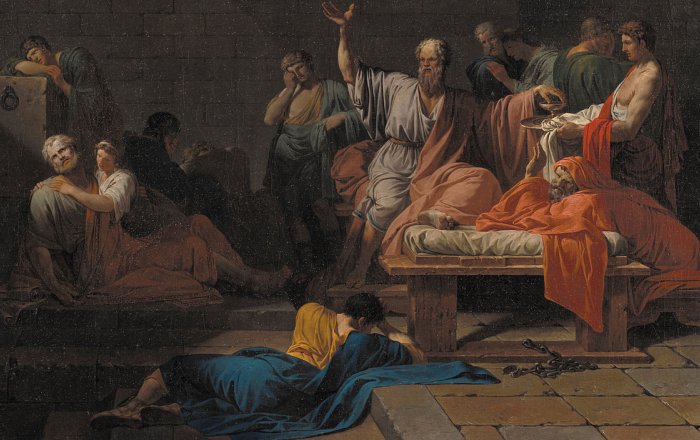Socrates: Great Philosopher And Brave Man Who Still Inspires Many People
A. Sutherland - AncientPages.com - He was one of the most influential philosophers of all time and one of the greatest Greek philosophers. His life, enigmatic personality, and thoughts strongly influenced ancient and modern philosophy.
Many still consider Socrates the "Father of Western Philosophy," but in his native Athens, he was both recognized and controversial.
The Death of Socrates by Pierre Peyron, 1787. Image credit: Pierre Peyron - Public domain
Born in 470/399 BC in Athens, Greece, Socrates was the son of a mason and a midwife. He began work early as a sculptor and stonemason, and for some time, he joined the army and participated in the Peloponnesian War (431 to 404) that was fought between Athens and Sparta.
He was a brave soldier and ended his life as a brave man.
The famous philosopher did not leave any writings of his teachings; what we know of Socrates comes from the writings of his students: Plato and Xenophon.
These records show that the great man worked hard before he finally focused his mind on philosophy.
Surrounded by a small group of admirers, Socrates is portrayed as a man of great insight, integrity, self-mastery, and brilliant, challenging skills.
It is unclear how the philosopher earned a living, but he attracted a group of young men who came to learn and study with him.
He had his Socratic method, according to which one must search for general, commonly held truths that shape beliefs and scrutinize them to determine their consistency with other views. Socrates sought to teach through a path of self-inquiry because self-inquiry is the humans' most potent instrument. Socrates – the great mind of the ancient Greek world - was always aware of the limitation of his knowledge.
He did not claim to have the answers but asked his students because he wanted them to think for themselves, question their own beliefs and dogmas, and search for truths.
Socrates said: 'I cannot teach anybody anything; I can only make them think,' and yet he was an excellent teacher for those who wanted to listen to him and learn. He used to say he was wise because he admitted he was ignorant. He also believed a person had to do what he thought was right, no matter what. He says the most extraordinary knowledge comes when we try to understand ourselves.
Among many stories about Socrates, there is, for example, one that can teach us so much:
One day, the great philosopher, accompanied by some of his students, went to see a well-known 'soothsayer.' Asked to speak about the nature of Socrates, the 'soothsayer' replied that Socrates had all the negative qualities of vanity, ego, fear, and hatred.
At this, his students were outraged because they didn't see these qualities in their teacher. However, at this point, the soothsayer continued. True, Socrates has these qualities, but unlike others, he can rise above them and keep them locked away.
On the streets of Athens, Socrates taught conducting diverse disputes with random passers-by on the streets; his way of teaching earned him both popularity and hostility.
Statue of Socrates from the Academy of Athens, Greece. Credit: Adobe Stock - anastasios71
Once a brave soldier, he started questioning government atrocities and attracted their dislikes. He was offered to choose between his death and his surrender to the government. If Socrates had rejected his beliefs, he could have been free and had another option. He could have tried to escape.
As a philosopher, however, he felt it was more important to stick to his beliefs.
To Socrates, surrender was equal to suicide. So he decided to embrace death. He was sentenced to death by hemlock poisoning for impiety and spoiling the youth. He died in 399 BC.
Written by – A. Sutherland - AncientPages.com Senior Staff Writer
Updated on June 19, 2022
Copyright © AncientPages.com All rights reserved. This material may not be published, broadcast, rewritten or redistributed in whole or part without the express written permission of AncientPages.com
More From Ancient Pages
-
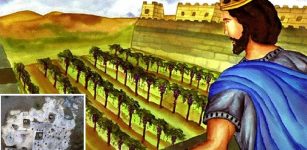 Biblical Vineyard Of Naboth Existed And Has Been Found
Archaeology | Aug 3, 2017
Biblical Vineyard Of Naboth Existed And Has Been Found
Archaeology | Aug 3, 2017 -
 Why Did Winter Baths Become So Popular?
Ancient History Facts | Jan 16, 2024
Why Did Winter Baths Become So Popular?
Ancient History Facts | Jan 16, 2024 -
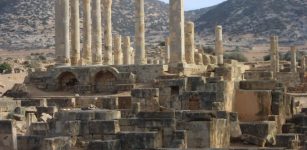 University Of Warsaw Archaeologists Return To Study Large Ancient City Of Ptolemais
Archaeology | Sep 8, 2023
University Of Warsaw Archaeologists Return To Study Large Ancient City Of Ptolemais
Archaeology | Sep 8, 2023 -
 Riddle Of The Ancient Lost City Beneath Missouri – A Puzzling Discovery
Civilizations | Mar 21, 2022
Riddle Of The Ancient Lost City Beneath Missouri – A Puzzling Discovery
Civilizations | Mar 21, 2022 -
 Ancient Egyptian Tombs With Stunning Trove Of Artifacts And Human Remains Unearthed In Saqqara
Archaeology | Jan 17, 2024
Ancient Egyptian Tombs With Stunning Trove Of Artifacts And Human Remains Unearthed In Saqqara
Archaeology | Jan 17, 2024 -
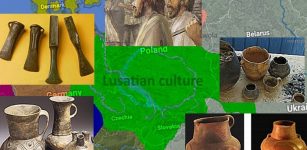 Lusatian Culture: Ancient Traders Of Central Europe Built Strongly Fortified Settlements To Withstand Scythian Attacks
Civilizations | Jan 27, 2024
Lusatian Culture: Ancient Traders Of Central Europe Built Strongly Fortified Settlements To Withstand Scythian Attacks
Civilizations | Jan 27, 2024 -
 5 Surprising Things DNA Has Revealed About Our Ancestors
DNA | Sep 27, 2023
5 Surprising Things DNA Has Revealed About Our Ancestors
DNA | Sep 27, 2023 -
 Neanderthals Invented Or Developed Birch Tar Making Technique Independently From Homo sapiens
Archaeology | May 30, 2023
Neanderthals Invented Or Developed Birch Tar Making Technique Independently From Homo sapiens
Archaeology | May 30, 2023 -
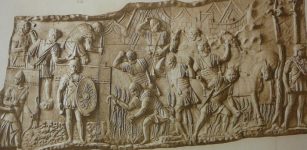 Secret Police In Ancient Rome – Frumentarii: Who Were They And What Was Their Role?
Featured Stories | Aug 12, 2019
Secret Police In Ancient Rome – Frumentarii: Who Were They And What Was Their Role?
Featured Stories | Aug 12, 2019 -
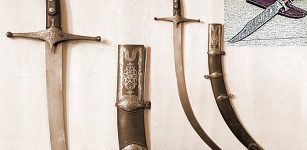 Ancient Secrets Of The Damascus Steel – Legendary Metal Used By Crusaders And Other Warriors
Artifacts | May 28, 2020
Ancient Secrets Of The Damascus Steel – Legendary Metal Used By Crusaders And Other Warriors
Artifacts | May 28, 2020 -
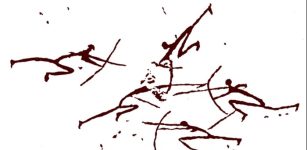 Violent Conflict Played A Crucial Role In Early Farming Societies In Neolithic Europe – New Study
Archaeology | Jun 19, 2023
Violent Conflict Played A Crucial Role In Early Farming Societies In Neolithic Europe – New Study
Archaeology | Jun 19, 2023 -
 2,000-Year-Old Fountain In Kibyra, The City Of Gladiators Flows Again
Archaeology | Jan 3, 2023
2,000-Year-Old Fountain In Kibyra, The City Of Gladiators Flows Again
Archaeology | Jan 3, 2023 -
 One-Eyed Giants Fachan Were As Dangerous As Polyphemus And The Cyclops
Celtic Mythology | May 21, 2019
One-Eyed Giants Fachan Were As Dangerous As Polyphemus And The Cyclops
Celtic Mythology | May 21, 2019 -
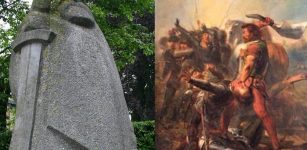 Grutte Pier – Legendary Giant Frisian Freedom Fighter Who Sought Revenge
Featured Stories | Dec 20, 2018
Grutte Pier – Legendary Giant Frisian Freedom Fighter Who Sought Revenge
Featured Stories | Dec 20, 2018 -
 Early Twelfth-Century Castle Walls Unearthed Outside Gloucester, England
Archaeology | Dec 9, 2015
Early Twelfth-Century Castle Walls Unearthed Outside Gloucester, England
Archaeology | Dec 9, 2015 -
 Native Americans And European Legends Tell Peculiar Beings From The Sky Still Live On The Earth
Featured Stories | May 16, 2018
Native Americans And European Legends Tell Peculiar Beings From The Sky Still Live On The Earth
Featured Stories | May 16, 2018 -
 Odeuropa – Unusual Project Will Recreate The Smells Of Old Europe And Store The Scents In A Library
News | Nov 17, 2020
Odeuropa – Unusual Project Will Recreate The Smells Of Old Europe And Store The Scents In A Library
News | Nov 17, 2020 -
 Mystery Of The Scottish Medieval Wanderer And The Bog Bodies At Cramond Investigated By Scientists
Archaeology | Mar 28, 2022
Mystery Of The Scottish Medieval Wanderer And The Bog Bodies At Cramond Investigated By Scientists
Archaeology | Mar 28, 2022 -
 Major Discovery Of Ancient Roman Temple – Largest Evidence Ever Of The Imperial Cult
Archaeology | Jan 5, 2024
Major Discovery Of Ancient Roman Temple – Largest Evidence Ever Of The Imperial Cult
Archaeology | Jan 5, 2024 -
 Is The Puzzling Miami Circle Much Older Than Previously Thought?
Featured Stories | Mar 14, 2021
Is The Puzzling Miami Circle Much Older Than Previously Thought?
Featured Stories | Mar 14, 2021

